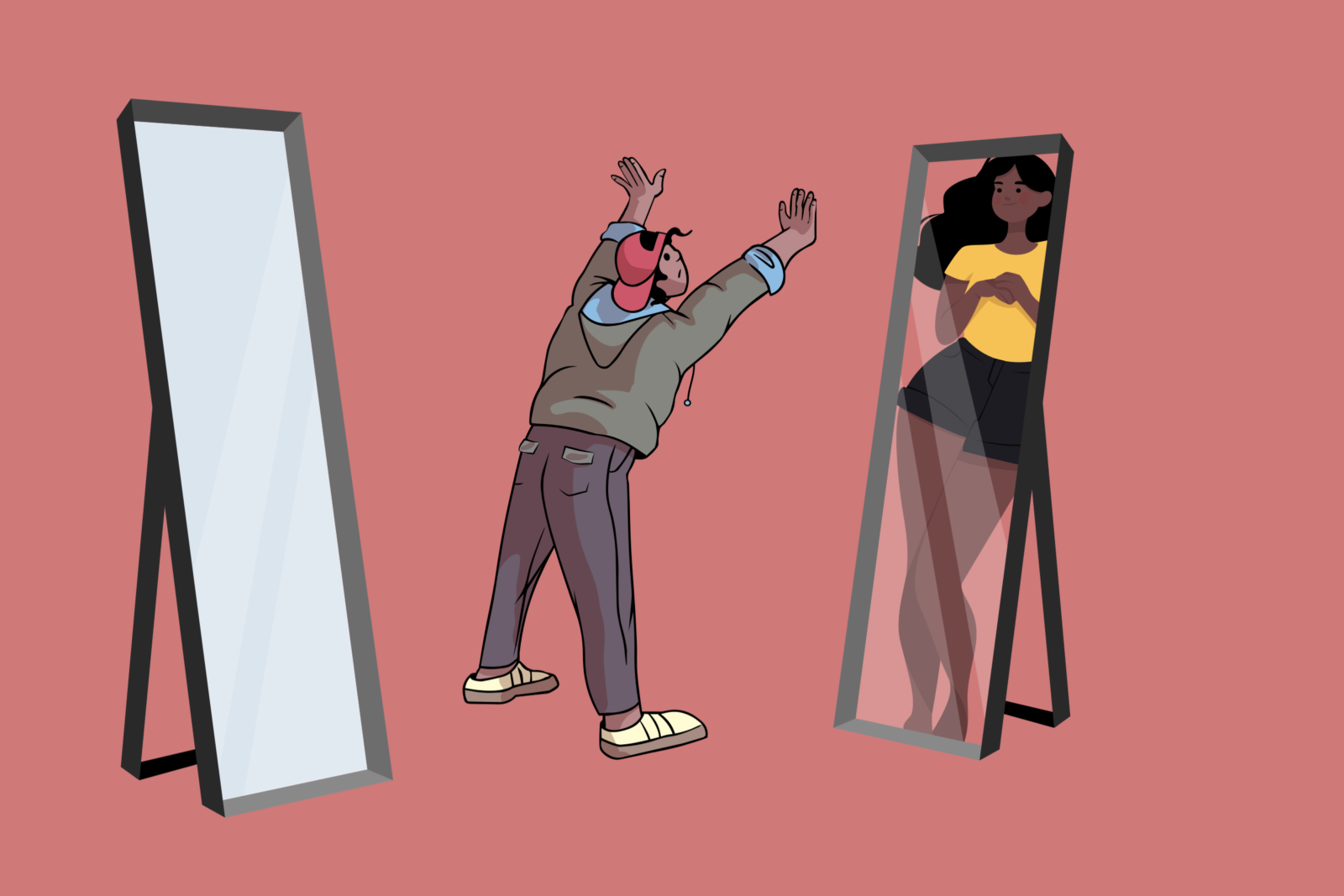‘Gender hegemony’: How colonialism distorted African perspectives of trans identity
- The colonial construction of transphobia and the continued enforcement of the gender hegemony, have created an environment in which transgender people have to conform to idealised depictions of femininity and masculinity to find a sense of community and safety.

Image description: An illustration of a person standing in front of a mirror with their hands lifted up. They are dressed in a green hoodie that’s slightly folded and grey pants. They are also wearing beige sneakers and a maroon face cap and there’s a mirror behind them as well. In the mirror in front of them is a reflection of a feminine presenting person dressed in a mustard blouse, black short, and has black flowing hair.
As a non-binary trans woman, my usual gender presentation does not attune with the typical ideas regarding feminity. I realized this a while ago while living in Tamboerskloof, an area in the center of Cape Town, South Africa. I was having a bad day and wanted to get some snacks from my local grocery store. I was wearing no make-up, a baggy band shirt, and a comfy pair of sweatpants.
I made the five-minute walk down the road to get myself some ice cream and a bottle of wine. As I walked back to my apartment, two men followed me home, yelling transphobic slurs at me. Eventually, the two men cornered me outside my apartment and threatened to “fix me” with sexual violence. I made the same walk two weeks later in a dress and make-up with zero harassment. I learned a lesson that day. I was putting my life on the line if I ventured into the city center without appearing vaguely feminine.
This forced me to start to think about African societal perceptions of womanhood and femininity and how much of what we tout to be African ideas of gender were set up and continue to be propped by colonialism and its many instruments.
The misguided belief that queerness is wholly “un-African” is cited as the justification for assaults on trans identity. Yet these beliefs are a misrepresentation of Africa’s history and cultural identity. The anthropological and historical records show clear examples of analogues to queer identity that existed in African society before colonialism and the steady advance of Western imperialism.
Pre Colonial gender nonconformity
Records from the archives of the Portuguese Inquisition speak about an enslaved African called Antonio who took the female alias of Vitoria upon her arrival in Portugal from Benin. Her presentation was slightly ambiguous, but she styled herself and conducted herself as a woman. Vitoria earned a living as a sex worker on the streets of Lisbon and witnesses described her as using feminine gestures to draw her clients’ attention. For example, when she saw two Flemish men pass her house, she winked at them like a ‘woman’.
Additionally, she was often seen walking from Lisbon’s riverfront with a water vessel on her head. This behavior was viewed as commonplace for women, as they often gathered water from the Chafariz de El-Rei (King’s Fountain).
Vitoria’s neighbours gossiped and speculated about her actual sex. Some claimed she was a man, while others insisted that she was castrated. The reality was that it seemed like Vitoria concealed her penis by tucking it, albeit in a much more rudimentary fashion than what is done in the 21st century. She would tie a ribbon around her penis, pulling it back and binding it to her leg.
Eventually, the Inquisition arrested Vitoria on charges of sodomy. Vitoria insisted that she was a woman and had the anatomy to prove it during her questioning. The Inquisitors did not believe her, demanding to know whether she created her female anatomy or whether it was the result of some illness. Vitoria answered that she was born with it and that many others in Benin were like her. Ultimately, the Inquisitors subjected her to a brutal, undignified medical examination. The medical report concluded that Vitoria had male genitalia. She was given a life sentence as an enslaved person in the king’s galleys for committing the “sin of sodomy”.
Vitoria’s name was the first among a handful of transgender Africans who appeared in the records of the Portuguese Inquisition between 1550 and 1730. In Western history, their names are lost to the archival footnotes of a sweeping inquisition. The entries read as the simplistic persecution of the same-sex behaviours of transgender Africans. However, their names have significant cultural value in the context of queer identity in Africa.
Their names are further proof of analogues to trans identity appearing within several pre-colonial African societies. What it meant to be a woman in many African pre-colonial societies was not rigid. Many African cultures had transgressive gender performances built into their cultural fabric.
For example, during precolonial times, the mudoko dako, effeminate males among the Langi of northern Uganda, were treated as women and could marry men. The Mwami prophets of the Ila people in Zambia were men who dressed as women, went about traditional women’s work and slept with women without having sex with them. Among the Lugbara people, transgender individuals often carried out communication with the spirit world. Due to the duality of their existence, their qualities meant they were better suited to serve as messengers between the human and spirit worlds. Transgender women mediums are named okule (“like women”), and transgender men mediums are called agule (“like men”). The chibados of Angola were male diviners who channeled feminine spirits by acting like women.
The commonality between many of these examples is that they inhabited a spiritual role within their respective societies. They possessed a dualistic gender identity, giving them unique power to communicate with the spiritual realm. There is a strong correlation between trans identity and being spiritually powerful in precolonial African societies.
However, it would be anachronistic to call these ways of being “transgender”. Instead, we would retrofit pre-colonial cultural practices into gender categories that we use in the twenty-first century. Queer scholars only developed the terminology of modern trans existence in the 1980 and placing unique spiritual practices, like that of the chibados, into a Western category of gender identity strips away the nuance of the nonconformity in pre-colonial African society.
The colonial import of transphobia
It is important to note that the nonconformity in precolonial Africa does not map perfectly to modern trans identity.
Colonialism forced the rigid Western gender hegemony onto African societies. The gendered worldview of colonists did not easily map onto the societies they encountered. “There is among the Angolan pagan much sodomy,” wrote one Portuguese soldier in 1681, “sharing one with the other their dirtiness and filth, dressing like women.”
The transgressive gender performances became the target of efforts to “civilize” African societies. Religion was used as a means to oppress traditional African spiritual practices. The church disseminated messages that people who did conform to the Western ideal of men and women could negatively influence Christian colonial society. As part of their exploitation and subjugation of the African continent, the colonial project baked transphobia into the fabric of postcolonial Africa.
When the colonists extended their empires to Africa, trans identity was an offense in their lands. Imperialism exported these crimes to Africa, creating new crimes that did not exist before. However, as the former colonies started gaining independence in the 20th century, the colonial empires had already done away with the criminalisation of queer identity. The exported transphobic laws provided effective ammunition for repressive post-independence African governments.
The political elite of Africa rewrote the history of African sexualities, annihilating trans identity to bolster their control over the political and social context. This revisionist history asserts their control over their nation’s identities, and citizens come to depend upon the authorities for their collective sense of self.
In their desperate attempts to maintain political legitimacy, African leaders have created an enviroment where transgender people are frequently persecuted. Furthermore, their invocation of a colonial gender hegemony that holds no room for gender nonconformity, despite the Africanness of that nonconformity, forces trans African people to live in constant fear.
Conformity as survival
The colonial construction of transphobia, and the continued enforcement of the gender hegemony, have created an environment in which transgender people have to conform to idealised depictions of femininity and masculinity to find a sense of community and safety.
If I have to go to the centre of Cape Town, or some of its conservative suburbs, I am more inclined to present more feminine than I would for visiting my local queer cafe. The process is exhausting. I live in constant fear when I go into areas like Sea Point, which claims to be a queer hub, or Observatory, which is lauded by many as a melting pot of queer culture, that I will relive experiences that have left me traumatised.
I have to be constantly worried about whether someone will decide that my clothing screams “man” and harass me.
Globally, trans women are expected to pursue hyper-femininity. If a trans woman doesn’t embody idealized visions of femininity (long hair, contoured makeup, tucking, tight dresses etc.), then their womanhood is questioned. Their mannerisms have to conform to the desires of the male gaze and the prescripts of the cis heteropatriarchy.
In the West, the pursuit of hyper-femininity is enforced mainly as a cultural requirement. The assimilationist culture of particular trans communities uses hyperfeminine ideals as a means to gatekeep trans identity. However, in Africa, a large part of conforming to the ideals of femininity is a matter of safety. We don’t choose to pass, out of a desire to achieve an idealized vision, but rather out of sheer necessity.
Forcing people to step outside of their preferred performance of gender to conform to a narrow prescription of womanhood eliminates their agency. It is crucial for this conversation to begin with an understanding that, for African trans people, the fires of transphobia which in turn lead to a performance of gender continue to be stoked by the constructs of Western imperialism.
Conformity is necessary for our survival, and that duality should be present in the discourse around gender obedience among African trans people.
We are trying to stay alive.
Edited/Reviewed by Caleb Okereke, Uzoma Ihejirika, and PK Cross.
a non-binar
Cassandra Roxburgh is an Associate Editor at Minority Africa. Fae is a South African journalist predominantly covering the environment, transgender liberation, and the intersection between activism and technology. Fae has written for Yes! Magazine, Mail and Guardian, and News24. Cassandra holds an LLB from the University of Stellenbosch, and is currently finishing faer LLM thesis on corporate liability for environmental harms in Africa.



